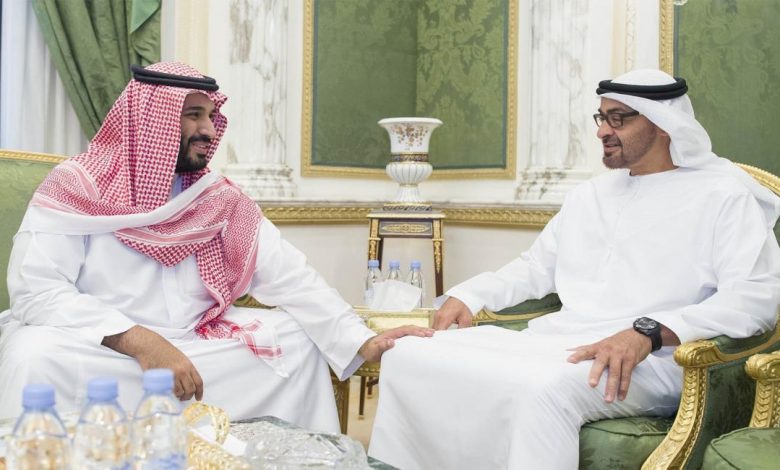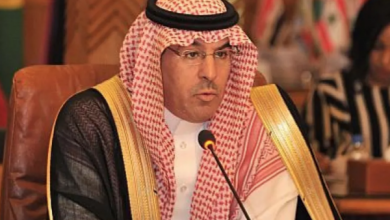Power Struggle Governs the Relationship between Mohammed bin Salman and Mohammed bin Zayed

The international community is increasingly observing a power struggle that now governs the relationship between Crown Prince Mohammed bin Salman and UAE President Mohammed bin Zayed Al Nahyan after years of showcasing their alliance.
The opposition newspaper “Sout Al Nas” highlighted the coverage by Western media on the trajectory of the relationship between Mohammed bin Salman and Mohammed bin Zayed since the latter became Crown Prince of Abu Dhabi.
Western newspapers presented analyses of the closeness and distance between the two leaders, interpreting their actions in the context of events unfolding in their countries and the Arab region and the impact of their foreign policies.
The Western media shed light on how bin Salman and bin Zayed aspire to lead and play a dominant role in the region, in addition to competing for wealth, investments, influence, and sports dominance.
Once hidden beneath the surface, these differences have now come to the forefront, dispelling the notion that their relationship was unshakable and destined to be cooperative.
The Wall Street Journal reported in a July 18, 2023 article that tensions exist between Saudi Arabia and the UAE, noting that bin Salman distanced himself from his “mentor”, the UAE President, due to the competition for dominance in the Gulf region, where American influence has waned. This reflects the competition for geopolitical and economic power in the Middle East, as well as in the global oil markets.
In December 2022, Crown Prince Mohammed bin Salman gathered local journalists for a rare and informal conversation, in which he delivered a shocking message, stating that the UAE, their ally for decades, had “stabbed them in the back” and that “they will see what I will do,” according to individuals familiar with the discussion.
The two men had spent a decade ascending the ladder of power in the Arab world, but when they reached the summit, they disagreed on who should call the shots in the Middle East, where American influence had receded.
The divergent interests between their countries in Yemen have affected efforts to end the conflict, in addition to the UAE frustrating Saudi Arabia’s oil policies and attempting to increase oil prices, creating rifts in OPEC.
On July 23, 2019, the American website Lobe Log stated that bin Salman would reassess his alliance with bin Zayed after the latter decided to withdraw his forces from Yemen.
This came as Abu Dhabi and Riyadh jointly stifled the Arab Spring and the aspirations of Arab nations since the beginning of the Arab Spring in the period between 2010 and 2011 and as demands for democratic change in the Arab world grew.
The website enumerated the disasters caused by this alliance, including the Saudi ally’s role in restoring autocracy in Egypt by financially supporting the regime of President Abdel Fattah el-Sisi after ousting the late former President Mohamed Morsi in 2013. Their intervention in Yemen, under the pretext of reinstating President Abdrabbuh Mansur Hadi to the capital Sanaa, has resulted in human tragedies beyond this goal.
In June 2020, The Daily Telegraph revealed that the two allies, bin Salman and bin Zayed, the elder brother of the owner of Manchester City Football Club, found themselves on opposing sides in the context of the English Premier League. During this period, attempts were made to acquire a club from the English Premier League and purchase Newcastle United for £300 million.
In February 2021, “Bloomberg” discussed the impact of the escalating economic competition between the UAE and Saudi Arabia on their strong alliance, pointing out that the personal relationship between the Crown Prince of Saudi Arabia and the Crown Prince of Abu Dhabi at the time, both of whom were de facto rulers of their respective countries, allowed them to steer the Gulf Cooperation Council and set the agenda for the Arab world.
It stated that Emiratis and Saudis are seeking ways to diversify their economies and move away from hydrocarbon energy while expanding tourism, financial services, logistics, petrochemicals, and technology sectors. Given the shortage of required talents to support these ambitions, they are competing to attract foreign expertise and investments.
On July 5, 2021, the Financial Times revealed deterioration in Saudi-UAE relations on multiple fronts, including disputes over the UAE’s plans to expand its production capacity to support economic diversification.
It warned of fissures between the two countries, with Riyadh and Abu Dhabi disagreeing on issues ranging from oil production and Yemen to normalization with Israel and how to handle the COVID-19 pandemic.
Abu Dhabi reportedly expressed concern over the speed of Saudi reconciliation with Qatar, despite accepting Saudi-led efforts to end the trade and travel blockade on Qatar. Meanwhile, the UAE’s embrace of Israel following the normalization of relations last year surprised Saudi Arabia.
Andreas Krieg wrote in an article for the Middle East Eye that the growing divergence of interests between Saudi Arabia and the UAE since 2019 has led to severe cracks in the fragile “strategic consensus” that previously received widespread acclaim. Furthermore, relations between them have noticeably deteriorated since the election of U.S. President Joe Biden.
He added that bin Salman and bin Zayed, who were described as the “two powerful men” in the Gulf region during the tenure of U.S. President Donald Trump, exerted their will on their neighbours. However, since bin Salman now sits more firmly in the driver’s seat in Riyadh, the honeymoon period between the two men has certainly ended.
On July 13, 2021, the analytical website “Eurasia Review” revealed that Saudi Arabia’s Crown Prince wanted to break free from bin Zayed’s influence, his counterpart in Abu Dhabi at the time. Bin Salman no longer wants to be seen as a former disciple and peer of the UAE leader. The site affirmed that the Saudi-Emirati competition and their ambitions make it unlikely to find structural ways to manage the disputes.
There is little doubt that the potential future Saudi king will seek to put an end to the perception that the UAE calls the shots in the Gulf and the Middle East, rather than the Kingdom.





